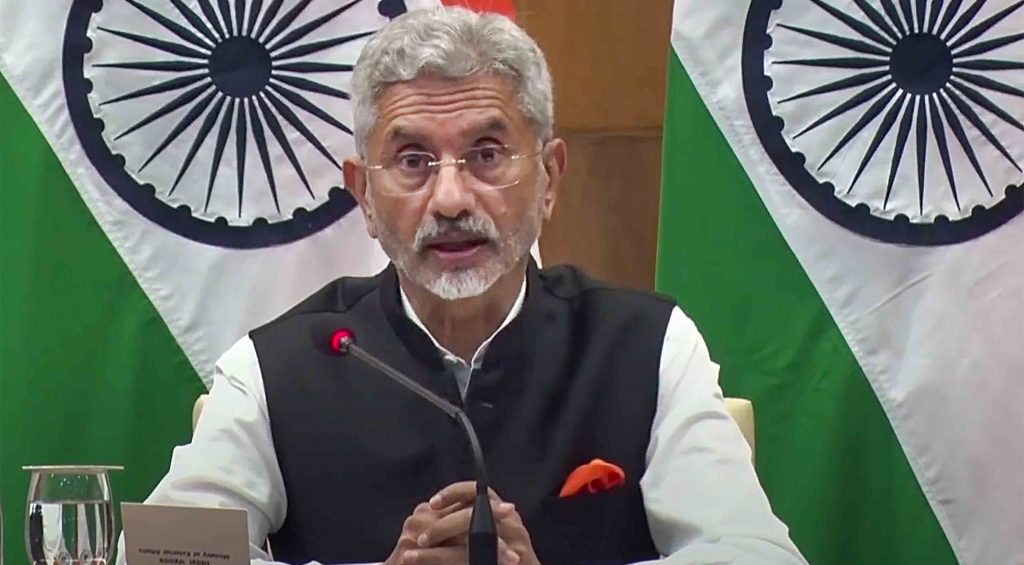New Delhi: India clearly told China to complete the disengagement process in the remaining friction points in eastern Ladakh quickly. India asserted Friday bilateral ties cannot return to normal if the situation in the border areas is ‘abnormal’.
In his nearly three-hour ‘candid’ talks with visiting Chinese Foreign Minister Wang Yi, External Affairs Minister S Jaishankar conveyed that restoration of normalcy in ties will require restoration of peace and tranquillity in the border areas.
“If we are both committed to improving our ties then this commitment must find full expression in the ongoing disengagement talks,” Jaishankar said at a media briefing shortly after the talks.
Describing the current situation as a ‘work in progress’, S Jaishankar also said that relations between India and China have been ‘disturbed’. This is due to the Chinese actions in April 2020.
Wang flew into Delhi from Kabul Thursday evening in an unannounced trip. It is the first highest-level visit to India by a Chinese leader after the border standoff in eastern Ladakh erupted nearly two years ago.
Jaishankar referred to a series of military and diplomatic talks between the two sides. The minister said progress has been achieved on several friction points from the disengagement perspectives. Now this process needs to be taken forward.
“I would describe our current situation as a work in progress, obviously at a slower pace than desirable. My discussions with Foreign Minister Wang Yi today were aimed at expediting that process,” Jaishankar informed.
Also read: Chinese threat in eastern Ladakh has ‘by no means reduced’: Army chief Gen Naravane
To a question, Jaishankar referred to the presence of a large number of troops in the border region in contravention of laid down norms and agreements.
“If you ask me if our relationship is normal today, my answer to you is no, it is not. It cannot be normal if the situation in border areas is abnormal,” Jaishankar said.
“Foreign Minister Wang spoke about China’s desire to return to normalcy (in the relationship) while also referring to the larger significance of our ties. I was equally forthcoming that India wants a stable and predictable relationship but restoration of normalcy will obviously require a restoration of peace and tranquillity,” added Jaishankar.
The minister said the military and diplomatic talks produced positive outcomes but noted that the situation in the region was not normal.
“We have a situation where peace and tranquillity in the border areas have been disturbed. So the situation there is not normal. (If) the situation there is not normal, if peace and tranquillity is the foundation of the basis of how we are going forward, then obviously that is also disturbed,” asserted Jaishankar.
The external affairs minister described the talks as a ‘candid’ exchange of views.
“We met for about three hours and addressed a broad and substantive agenda in an open and candid manner. We discussed our bilateral relations that have been disturbed as a result of the Chinese actions in April 2020,” Jaishankar said.
“The occasion provided an opportunity to exchange views on major international issues including Afghanistan and Ukraine. We also took up some other important concerns in our bilateral relationship including education travel and commerce,” Jaishankar added.
India and China have held 15 rounds of military talks to resolve the face-off in the remaining friction points in eastern Ladakh. The 15th round of talks was held March 11 to resolve the pending issues in the eastern Ladakh region. However, there was no forward movement in the talks which were aimed at resolving the remaining issues.
In September 2020, Jaishankar and Wang held extensive talks in Moscow on the sidelines of a conclave of the Shanghai Cooperation Organisation (SCO) during which they reached a five-point agreement to resolve the eastern Ladakh border row. The pact included quick disengagement of troops, avoiding action that could escalate tensions, adherence to all agreements and protocols on border management and steps to restore peace along the Line of Actual Control (LAC).
